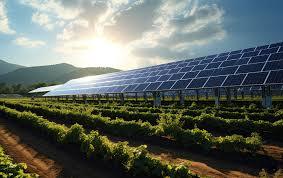- This topic is empty.
-
AuthorPosts
-
2025-01-06 at 2:21 pm #6285
In recent years, with the rapid development of renewable energy technology, photovoltaic power generation has been increasingly used around the world. In particular, agricultural photovoltaic projects, a model that combines agriculture and energy production, have gradually attracted widespread attention and promotion. In agricultural photovoltaic projects, bifacial solar panels, as an emerging technology, have shown significant potential due to their unique bifacial power generation advantages. So, can bifacial solar panels be fully applicable to agricultural photovoltaic projects? Let's analyze from multiple aspects such as technical characteristics and applicability.
1. What is a bifacial solar panel?
A bifacial solar panel is a photovoltaic component that can absorb sunlight from both the front and back to generate electricity. Compared with traditional single-sided solar panels, the bifacial panel has a design that can absorb scattered light and reflected light on the back, which significantly improves power generation efficiency.
Its working principle is to achieve bifacial power generation by receiving direct sunlight on the front and absorbing reflected light from the ground and the surrounding environment on the back. Generally, the efficiency of bifacial solar panels is 10%-30% higher than that of single panels, depending on the installation environment and the intensity of the reflected light on the back.
2. Characteristics of agricultural photovoltaic projects
Agricultural photovoltaic projects are an innovative model that combines photovoltaic power generation with agricultural production. By installing photovoltaic modules above farmland, greenhouses, or waters, the dual benefits of agriculture and energy are achieved. The characteristics of this model include:
Efficient use of land: agricultural planting and photovoltaic power generation are carried out simultaneously on the same piece of land.
Environmental sustainability: photovoltaic modules provide shading effects to protect crops from excessive sunlight or extreme weather.
Improved economic benefits: power generation income provides an additional source of income for agricultural producers.
Green energy: using clean energy to reduce carbon emissions and help achieve global sustainable development goals.

3. Advantages of bifacial solar panels in agricultural photovoltaics
The back of bifacial solar panels with high efficiency in power generation can absorb scattered light reflected from the ground, which gives it a unique advantage in agricultural photovoltaic projects. Farmland is usually bare soil or covered with reflective film. This environment is very suitable for the backlight absorption characteristics of the double panel, thereby achieving higher power generation efficiency.
High adaptability Photovoltaic modules in agricultural photovoltaic projects are usually installed on elevated brackets to ensure that crops have enough space to grow. This installation method enables the back of the double panel to effectively absorb ground-reflected light and avoid front shading.
Shading effect Bifacial solar panels can provide appropriate shading for crops by adjusting the inclination and layout. This can not only prevent crops from being damaged by excessive light but also optimize the growth conditions of crops and increase agricultural yields.
Durability and environmental adaptability Bifacial solar panels adopt a double-layer tempered glass design, which has strong resistance to wind and sand, moisture, and corrosion, and is very suitable for use in agricultural environments such as dusty, humid, or salt fog.
Bifacial solar panels are fully capable of being used in agricultural photovoltaic projects due to their high efficiency in power generation, strong adaptability, and good durability. Despite some technical and economic challenges, as technology matures and the market expands, bifacial solar panels will play an increasingly important role in the field of agricultural photovoltaics. Through reasonable design and layout, bifacial solar panels can not only help farmers increase their economic benefits, but also promote sustainable development in the fields of agriculture and energy, and truly achieve a win-win goal.
As a bifacial solar panel distributor, we are committed to providing efficient solar solutions for agricultural photovoltaic projects. By combining advanced bifacial photovoltaic technology, our products can effectively improve power generation efficiency in agricultural production environments and make full use of reflected and scattered light from the ground. Whether it is an orchard, greenhouse, or livestock farm, bifacial solar panels can not only provide suitable light for crops but also reduce energy costs. Our bifacial solar panels are made of highly durable materials and can operate stably under harsh environmental conditions to ensure the long-term benefits of agricultural photovoltaic projects. If you are looking for a reliable agricultural photovoltaic solution, our products will be your ideal choice to help you achieve your sustainable development goals.
http://www.fgnexsolar.com
Wuxi Fgnex Technology Co., Ltd. -
AuthorPosts
- You must be logged in to reply to this topic.

